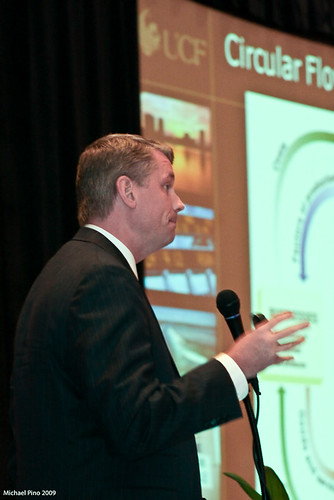 University of Central Florida economist Sean Snaith said slow will continue to be a key word in his latest forecast from the UCF Institute for Economic Competitiveness.
University of Central Florida economist Sean Snaith said slow will continue to be a key word in his latest forecast from the UCF Institute for Economic Competitiveness.Snaith he predicts unemployment in Florida will remain above 9 percent until the end of 2014 – but that some areas will see growth.
Payrolls and incomes are expected to creep up, retail sales will be much stronger, and housing starts will go up, Snaith predicts.
Still, he said, things won't look like 2006-2007 for quite some time.
"The year is shaping up to be another year of subpar growth," the institute said in its report. "Growth, to be sure, will continue and 2012 will be an improvement over a largely disappointing 2011, but economic growth for the year will (be less than) 2 percent and payrolls will expand by just 1.8 percent….
"The near term economic picture for Florida is for a modest acceleration of the pace of recovery, including the labor market over the next two quarters," the report said.
But, Snaith noted, "the damage to our economy from the recession, housing and financial crises was severe, and the process of rebuilding will take time."
State economists have come to share Snaith's caution, after getting a bit giddy earlier in the year. Revenue forecasters for the state had projected strong growth numbers that back in the spring had given lawmakers hope that there might be state budget growth this year, or at least flat tax revenue. But after a couple months of warnings that taxes weren't coming in as strong as first thought, economists in October reduced their projections fairly dramatically, slicing $1.6 billion from the state's forecasted tax revenue over the next year and a half.
Much of Florida's fate is tied to the national economy – as it goes so go the local economies to a certain degree. In Florida, that link is particularly acute because of the state's reliance on people moving here, either in retirement or for new opportunities – when housing was booming, there was a stream of people moving to the state to take part in that boom – and people coming here on vacation.
No comments:
Post a Comment